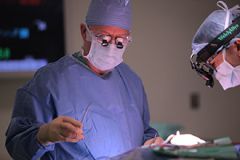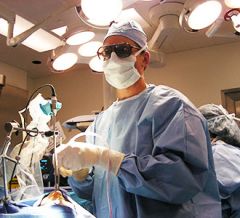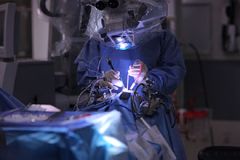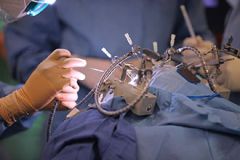
Neurosurgery (also called neurological surgery) is a highly specialized medical field focused on surgical treatment of disorders of the brain and spine. The Department of Neurosurgery at Weill Cornell Medicine and the Weill Cornell Medical College is a leader in advanced minimally invasive treatment methods, cutting-edge laboratory and clinical neurosurgical research, and the training of the next generation of neurosurgeons.
The Department of Neurosurgery has a three-part mission:
TEACHING
The faculty and instructors of the Department of Neurosurgery are committed to training tomorrow’s neurosurgeons, both in the classroom at the Weill Cornell Medical College and through our neurological surgery residency program, fellowships, and continuing medical education courses.

RESEARCH
The Department of Neurosurgery operates multiple laboratories that are investigating new treatments for brain tumors, spinal disk degeneration, cerebrovascular conditions, and Parkinson’s disease and other movement disorders. We are also pioneers in clinical research, conducting a wide range of clinical trials on neurosurgical conditions. More about our Laboratory Research and Clinical Trials.
PATIENT CARE
In our clinical practice, our surgeons perform state-of-the-art procedures for a wide range of brain and spine conditions. We are fortunate to be a part of the NewYork-Presbyterian/Weill Cornell Medical Center, long ranked as the #1 hospital in New York, with one of the top neurosurgery programs in the nation. Because we believe in comprehensive care, our department also includes specialists our patients may need, right here in the same place: neuroendocrinologists, neuroradiologists, and neuropsychologists.

Although traditional neurosurgery relied heavily on open surgery such as craniotomies and craniectomies (in which a portion of the skull is removed to allow the neurosurgeon access to the brain), today’s neurosurgeons are more likely to use whisper-thin tools that require smaller incisions and less trauma and that allow for faster recovery times. Modern neurosurgery includes:
Microsurgery: Neurosurgeons today can operate using a microscope to visualize the tiniest of brain and spine structures. A cerebrovascular neurosurgeon can perform microneurosurgery to correct vascular disorders such as aneurysms; a neurosurgeon specializing in spine surgery can use a microscope to assist in the surgical repair of herniated discs and other spinal disorders.
Endoscopic neurosurgery: Neurosurgeons who specialize in endoscopic surgery use small, flexible, lighted tubes called endoscopes to visualize various parts of the brain, skull base, or spinal cord through small openings. The evolution of endoscopic neurosurgery has greatly advanced the treatment of pituitary tumors (which can now be treated through the nasal passages with no incisions at all); endoscopy is also invaluable for treating cerebrospinal fluid leaks, disorders of the cranial nerves, and cysts and tumors that form in the brain and spine.

Interventional neuroradiology (INR): Interventional neuroradiology is a relatively new specialty that combines advanced three-dimensional imaging techniques with endoscopic surgical procedures. INR specialists – neurosurgeons with advanced training in radiology – can perform minimally invasive endoscopic techniques using high-tech imaging equipment to guide their work. (See more about our Interventional Neuroradiology Program.)
Stereotactic radiosurgery: Neurosurgeons use stereotactic radiosurgery for precise delivery of highly focused radiation that can pinpoint a tumor or other target with little or no effect on normal surrounding tissue. It has been used with great success in the treatment of brain tumors and other conditions as an alternative to “open” surgery. Neurosurgeons who specialize in stereotactic radiosurgery may perform procedures on a Linear Accelerator (LINAC), Gamma Knife, or CyberKnife. (See more about Stereotactic Radiosurgery at the Department of Neurosurgery.)
Intra-operative imaging: Advances in imaging techniques (such as CT, MRI, and PET scans) have allowed neurosurgeons to view highly detailed pictures while they are operating.
Lateral-access spine surgery: Neurosurgeons who specialize in spine surgery can now use advanced lateral-access procedures to approach the spine from the side, rather than through the large muscles of the back. Lateral access surgery causes less pain and trauma to the patient and allows faster recovery times. (See more about Och Spine at NewYork-Presbyterian at the Weill Cornell Medicine Center for Comprehensive Spine Care.)